Technical University of Dortmund
|
Technische Universität Dortmund | |
 Official logo of TU Dortmund University | |
Former names | Universität Dortmund |
|---|---|
| Type | Public |
| Established | 16 December 1968 |
| Budget | € 307 million[1]:38 |
| Rector | Ursula Gather |
Academic staff | 2,535[1]:33 |
Administrative staff | 1,324[1]:33 |
| Students | 34,235[1]:18 |
| Location | Dortmund, North Rhine-Westphalia, Germany |
| Campus | Urban/Suburban |
| Affiliations | UA Ruhr - University Alliance Ruhr |
| Website | www.tu-dortmund.de |
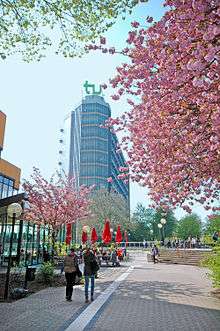
TU Dortmund University (German: Technische Universität Dortmund) is a university in Dortmund, North Rhine-Westphalia, Germany with over 30,000 students, and over 6,000 staff, offering around 80 Bachelor's and master's degree programs. It is situated in the Ruhr area, the fourth largest urban area in Europe. The university is highly ranked in terms of its research performance in the areas of physics, electrical engineering, chemistry and economics.[2]
History
The University of Dortmund (German: Universität Dortmund) was founded in 1968, during the decline of the coal and steel industry in the Ruhr region. Its establishment was seen as an important move in the economic change (Strukturwandel) from heavy industry to technology. The university's main areas of research are the natural sciences, engineering, pedagogy/teacher training in a wide spectrum of subjects, special education, and journalism. The University of Dortmund was originally designed to be a technical university, but in 1980, it merged with the adjacent Pädagogische Hochschule Ruhr that housed mostly humanities.
In 2006, The University of Dortmund hosted the 11th Federation of International Robot-soccer Association (FIRA) RoboWorld Cup. The university's robot soccer team, the Dortmund Droids, became vice world champion in the RoboWorld Cup 2002 and finished third in 2003.
On November 1, 2007, The University Dortmund has been renamed as TU Dortmund University.
Campuses
Following the Zeitgeist of the late 1960s in Germany, the university was built "on the meadows" (auf der grünen Wiese) about 2 miles (3.2 km) outside of downtown Dortmund. It consists of two campuses, North and South, which since 1984 have been linked by an automated hanging monorail system, the H-Bahn, that crosses the nature reserve between the campuses at a height of about 50 feet (15 m). One of the most prominent buildings of the university is the Mathetower (Mathematics Tower), which houses the faculty of Mathematics.
Faculties
- Faculty of Mathematics
- Faculty of Physics
- Faculty of Chemistry and Chemical Biology
- Faculty of Computer Science
- Faculty of Statistics
- Faculty of Biochemical and Chemical Engineering (BCI)
- Faculty of Mechanical Engineering
- Faculty of Electrical Engineering and Information Technology
- Faculty of Spatial Planning
- Faculty of Architecture and Civil Engineering
- Faculty of Business and Economics
- Faculty of Education, Psychology and Sociology
- Faculty of Rehabilitation Sciences
- Faculty of Human Sciences and Theology
- Faculty of Cultural Studies
- Faculty of Art and Sports Sciences
Research
Over 1,000 third-party funded projects, including a range of collaborative projects such as (transregional) Collaborative Research Centers, Research Units, Research Training Groups, a "Cluster of Excellence" and several Horizon 2020 research consortia. Nearly 300 professors teach and research at TU Dortmund University.
The university is particularly renowned for research in its four profile areas: Materials, Production Technology and Logistics, Chemical Biology, Drug Research and Process Engineering, Modeling, Data Analysis, Modeling and Simulation and Education, Schooling and Inclusion, in which it celebrates research successes beyond disciplinary limits, and at an outstanding international level.
Strong institutional networks in the science and engineering profile areas play a significant role in TU Dortmund's research successes. One Max Planck institute, two Fraunhofer institutes and two Leibniz institutes as well as the Federal Institute for Occupational Safety and Health (BAuA) are located in close proximity to the campus.
Student life
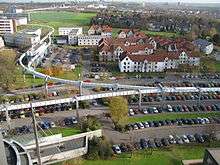
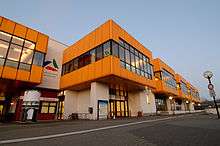
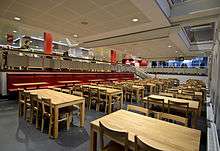
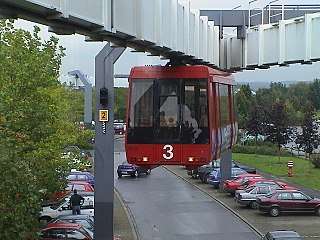
The university has a student radio station called eldoradio* which can be listened to also via livestream (link: see below).
Faculty of Computer Science
The first point of registration for .de-domains was at the Dortmund University Department of Computer Science.
Honorary doctorates
Former president of Germany, Johannes Rau was awarded an honorary degree from the university in 2004.
Carl Djerassi was awarded an honorary degree for his science-in-fiction in 2009.
See also
References
- 1 2 3 4 "Zahlen Daten Fakten 2016" (PDF). Dortmund University of Technology (in German). Retrieved 2017-06-10.
- ↑ (in German) Uni-News: Handelsblatt Ranking Archived 2012-04-23 at the Wayback Machine.